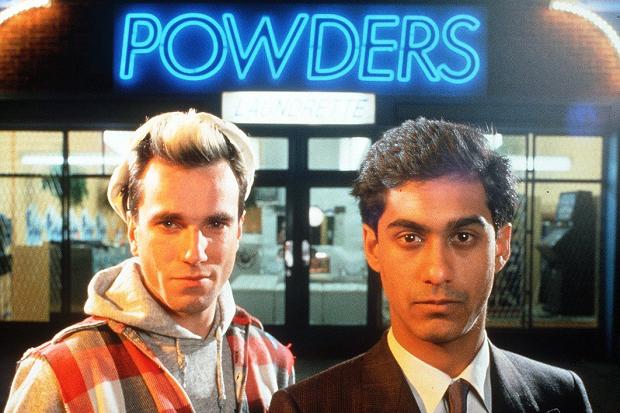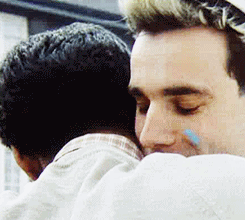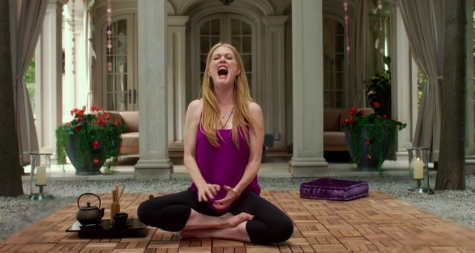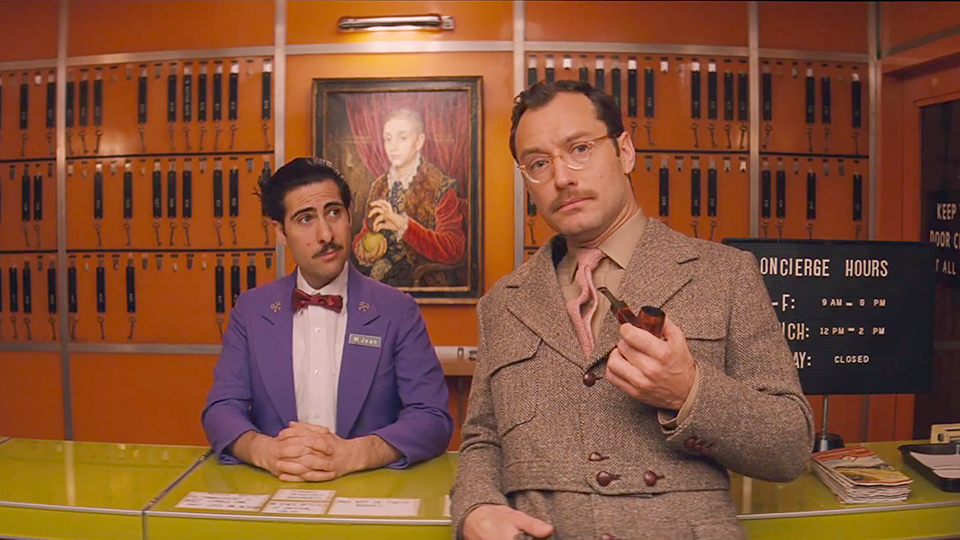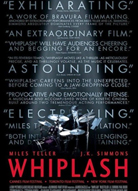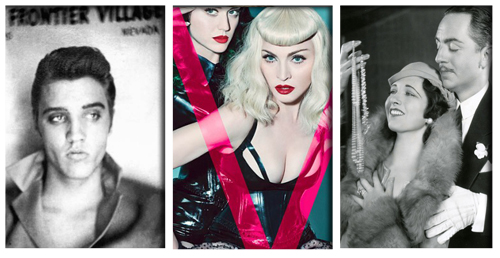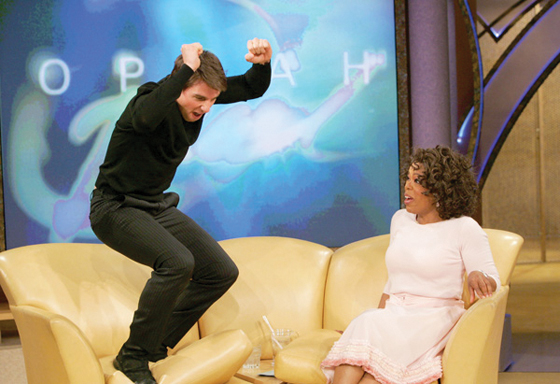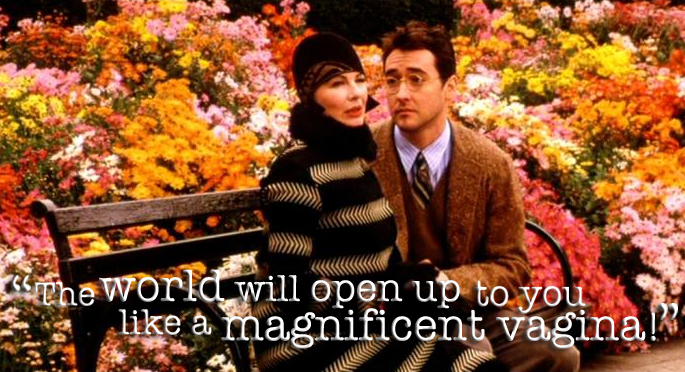I've seen 3 Women exactly 3 times. Look at me all numeriffic. Each time it shapes-shift fluidly like its still half submerged in the embryonic waters of pools, aquariums, nursing home baths, and dream floods that keep engulfing the women, particularly Sissy Spacek as "Pinky" (or "Mildred" depending on how you read the picture). She's the most permeable of them all.

Permeable, maybe, but never painlessly transforming; if the movie camera had never discovered Sissy Spacek's face in various stages of psychotic breaks (see also Carrie) it would have missed its calling entirely.
The first time I saw the film it was like looking a crystal clear umbillical cord between Persona (1966) and Mulholland Dr (2001). The second time it was a singular experience, untethered to other films from my favorite genre (Women Who Lie To Themselves™) and played as a remarkable feat of interiority and actressing (Shelley Duvall won "Best Actress" at Cannes and that jury deserves a prize of its own for going there.). With this third screening 3 Women morphed into a messy horror comedy, a pitch black and deeply uncomfortable but still funny horror comedy about social autism, menstrual cycles, and the terrors of having no center and no support system to reinforce your youness. Follow?
Whichever film 3 Women is while you're watching it, it's impossible to miss its obsession with twins.
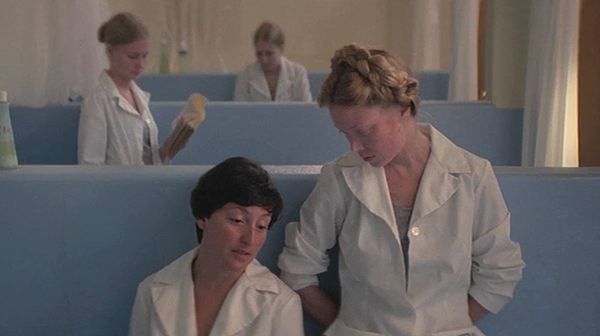
We don't like the twins. You'll learn about them soon enough"
Or, I'd argue more emphatically, its obsession with triplets; two identical, one fraternal. Though Altman's undervalued picture spends most of its time with the odd twosome of Millie (Duvall) and Pinky (Spacek) and though Pinky's initial trajectory seems to be very Single White Female in her urge to be with (or just be?) Millie, we're almost always dealing with triplets; the third is easy to miss, never identical and nearly always silent. Whether we're looking at actual twins (unfriendly blondes Polly & Peggy) or one woman reflected who appears to be two, or two women who appear to be three or four (reflections galore and too many images to screencap) or an actual rarer three-shot of the film's stars there's always some sort of triangulation going on when the image is placed in its narrative context.
Which is why my choice for "Best Shot" multiplies the multiples yet further and encapsulates absolutely everything that's so rich and weirdly specific yet vaguely disconnected about Millie and the movie itself. Millie has just been displaced from her own bedroom by Pinky when she returns to work and talks about nothing but Pinky.
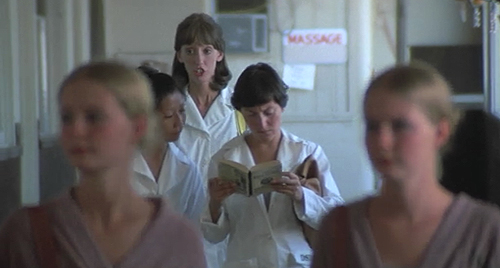
I think she'll be back to work next week. The doctors really thought she was going to die. What's worse there could have been brain damage!
Millie, singular and perpetually out of place Millie (note how Duvall towers over the other women like some absurd weed that needs pruning), trails her oblivious co-workers down the hallway in a continuous shot, talking non-stop as she does for the entire film. No one is listening despite her dramatic flourishes. Each of them are paired with their twin, literal or figurative ("Doris the Chinese one - she and I are best friends") shutting Millie out entirely. The last line as the undifferentiated women begin to dissipate out of the shot is brilliantly apt. It starts out all inclusive before it shuts someone out with its casually exclusive desperation. It's as lonely as Millie's foldout bed outside the now shuttered bedroom door.
She asked about each and everyone one of you... especially the twins."
There's every reason to believe that Millie didn't like Pinky as her perpetual shadow/other before the medical drama. But now she's alone again. And what could be worse than that?

More 3 Women?
Here's a Visual Index of all the "Hit Me With Your Best Shot" entries 'round the web.
Oscar Shut-Out
Oscar voters had no time at all for 3 Women despite their fondness for Altman in the 1970s. I'd gladly hand it nominations for Actress, Director, and Art Direction for starters. In fact, an early aborted mental draft of this article was entirely about the art direction.
Programming Note
One change in the upcoming schedule. I didn't realize that Warner Bros / DC had chosen an official day for Batman's 75th (the date of his birth is complicated) so we'll postpone that Batman-related Best shot episode until July in the second half of this season
 Friday, June 20, 2014 at 5:00PM
Friday, June 20, 2014 at 5:00PM 